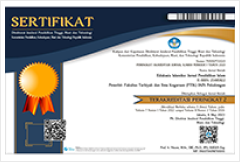The significance of Pesantren Moderate Islamic Education on Islamic Studies in Indonesia
DOI:
https://doi.org/10.28918/jei.v8i1.360Keywords:
Islamic Moderat, Education, Islamic Studies, Islamic Higher EducationAbstract
This research aimed to examine moderate Islamic education's role in developing Islamic studies in Indonesia. Pesantren education has proven its worth by graduating many students working in various professions, including as lecturers in Islamic studies at Islamic higher education. This study employed a qualitative approach where the researcher served as the primary data collector. The researcher collected data using interviews, observations, and conclusions using six stages of data management. The research findings have exposed the following: First, Islamic education deepens Islamic insight by studying the yellow book and internalizing moderate Islamic values in student interactions. The depth of methodology, practicing openness, and developing a growth mindset are three strengths of moderate Islam in pesantren. Second, alums who work as lecturers consistently become mouthpieces of religious moderation through lectures, community service, thought synthesis dissemination, scientific development, and institutional development. Thus, with its advantages, moderate Islamic education in pesantren can produce national figures who influence the dynamics and progress of Islamic studies in universities.
References
Abdul, M. (2019). Argumentasi Keniscayaan Tafsir Maqashidi Sebagai Basis Moderasi Islam. UIN Sunan Kalijaga.
Aini, A. Q. (2018). Islam Moderat di Pesantren: Sistem Pendidikan, Tantangan, dan Prospeknya. Edukasia Islamika, 3(2), 218. https://doi.org/10.28918/jei.v3i2.1689
Alam, M. (2020). A collaborative action in the implementation of moderate islamic education to counter radicalism." International Journal of Innovation, Creativity and Change. International Journal of Innovation, Creativity and Change., 11(7), 497-516.
Amin, A. (2016). Islamic studies di perguruan tinggi pendekatan integratif-interkonektif. Pustaka Pelajar.
Anam, K. (2022). Tajdid-Tajdid Prof. Drs. K.H. Yudian Wahyudi, M.A., Ph.D Men-”Pancasila”-kan Al-Asma? Cakrawala.
AR, S., & Supriyadi, M. (2022). Peran Kiai Langgar dalam Merawat Ajaran Islam Wasatiyah di Madura. Proceedings of Annual Conference for Muslim Scholars, 6(1), 679–690. https://doi.org/10.36835/ancoms.v6i1.359
Awaluddin, A. (2020). URGENSI AHLU SUNNAH WAL JAMA’AH DAN PENDIDIKAN KEBANGSAAN (Tinjauan atas Qonun Assasy Ahlu Sunnah Wal Jama’ah karya Rois Akbar Nahdlatul Ulama KH. Hasyim Asy’ari). Muslim Heritage, 5(2), 344. https://doi.org/10.21154/muslimheritage.v5i2.2301
Azis, A. A. et al. (2019). Implementasi Moderasi Beragama dalam Pendidikan Islam. Jakarta: Kelompok Kerja Implementasi Moderasi Beragama, Jakarta: Direktorat Jenderal Pendidikan Islam Kementerian Agama Republik Indonesia. Kelompok Kerja Implementasi Moderasi Beragama, Jakarta: Direktorat Jenderal Pendidikan Islam Kementerian Agama Republik Indonesia.
Azra, A. (2013). Pesantren and Madrasah: Modernization Of Indonesian Muslim Society. dalam Begawan Pemacu Ilmu Pengetahun. AIPI.
Azra, A., Afrianty, D., & Hefner, R. W. (2007). Chapter 8. Pesantren and Madrasa: Muslim Schools and National Ideals in Indonesia. In Schooling Islam (pp. 172–198). Princeton University Press. https://doi.org/10.1515/9781400837458.172
Dudung, A. (2018). Islam, Sufism, and Character Education in Indonesia History. TAWARIKH; International Journal for Historical Studies, 9(2), 159–176. https://doi.org/https://doi.org/10.2121/tawarikh.v9i2.1013
Fontaine, R. (2022). Three Kinds of Muslim Managers: Lessons from the Qur’an. Journal of Islamic Management Studies, 2(2), 67–79.
Hadi, S., & Anggraeni, D. (2021). Pesantren, Pecinan and Multicultural Education: A Qualitative Case Study of Kauman Pesantren, Lasem, Central Java. Edukasia Islamika, 6(2), 273–288. https://doi.org/https://doi.org/10.28918/jei.v6i2.4932
Hamruni, H. (2016). The Challenge and The Prospect of Pesantren in Historical Review. Jurnal Pendidikan Islam, 5(2), 413. https://doi.org/10.14421/jpi.2016.52.413-429
Indriyanti, T., Siregar, K. I., & Lubis, Z. (2017). Etika Interaksi Guru dan Murid Menurut Perspektif Imam Al Ghazali. Jurnal Online Studi Al-Qur’an, 11(2), 129–144. https://doi.org/10.21009/JSQ.011.2.03
J. W. Creswell. (2009). Research Design Qualitative, Quantitative, and Mixed Method Approaches. Sage.
J. W. Creswell. (2014). Educational Research: Planning, Conducting and Evaluating Quantitative and Qualitative Research. Pearson.
Litbang Kemenag. (2021). Religious Moderation. (Jakarta: Badan Litbang dan Diklat Kementerian Agama RI (Research, Development, Training, and Education Agency The Ministry Of Religious Affairs Republic of Indonesia). Litbang Kemenag. (Jakarta: Badan Litbang dan Diklat Kementerian Agama RI (Research, Development, Training, and Education Agency The Ministry Of Religious Affairs Republic of Indonesia).
Martin van, B. (1994). Pesantren and Kitab Kuning: maintenance and continuation of a tradition of religious learning, in Wolfgang Marschall (ed.), Texts from the islands. Oral and written traditions of Indonesia and the Malay world (Ethnologica Bernica, 4). University of Berne.
Prasetyo, S. E. (2017, April). Mengenal Sang Profesor Mengenal Prof Abd. A’la, Rektor Universitas Islam Negeri Sunan Ampel Surabaya. Jawa Pos, 1.
Rhew, E., Piro, J. S., Goolkasian, P., & Cosentino, P. (2018). The effects of a growth mindset on self-efficacy and motivation. Cogent Education, 5(1), 1492337. https://doi.org/10.1080/2331186X.2018.1492337
Sahiron. (2022). Pendekatan Ma’Nā-Cum-Maghzā Atas Al-Qur’An: Paradigma, Prinsip Dan Metode Penafsiran. UIN Sunan Kalijaga.
Shulhan, S. (2021). DESIGNING NEW TREND OF PESANTREN FOR SANTRI ENHANCEMENT IN RESPONSE TO GOLDEN INDONESIA VISION 2045. Reflektika, 16(2), 225. https://doi.org/10.28944/reflektika.v16i2.575
Shulhan, S. (2022). Establishing The Export Agent of Indonesia’s Moderate Islam Since The Elementary School Age. Proceedings of Annual Conference for Muslim Scholars, 6(1), 968–979. https://doi.org/10.36835/ancoms.v6i1.339
Sugiyono. (2014). Metode Penelitian Kombinasi. Alfabeta.
Suprayogo, I. (2006). Paradigma pengembangan keilmuan Islam perspektif UIN Malang. UIN-Maliki Press, Malang. UIN-Maliki Press, Malang.
Wekke, I. S. (2018). Arabic Teaching and Learning on Construction of Modern Instruction in Muslim Minority Pesantren Society. Edukasia Islamika, 32. https://doi.org/10.28918/jei.v3i1.1677






















